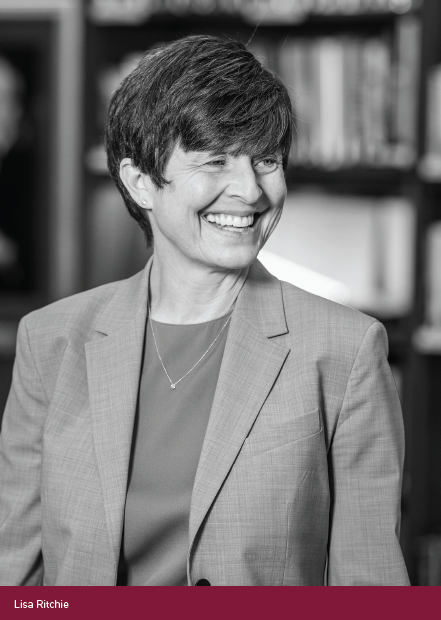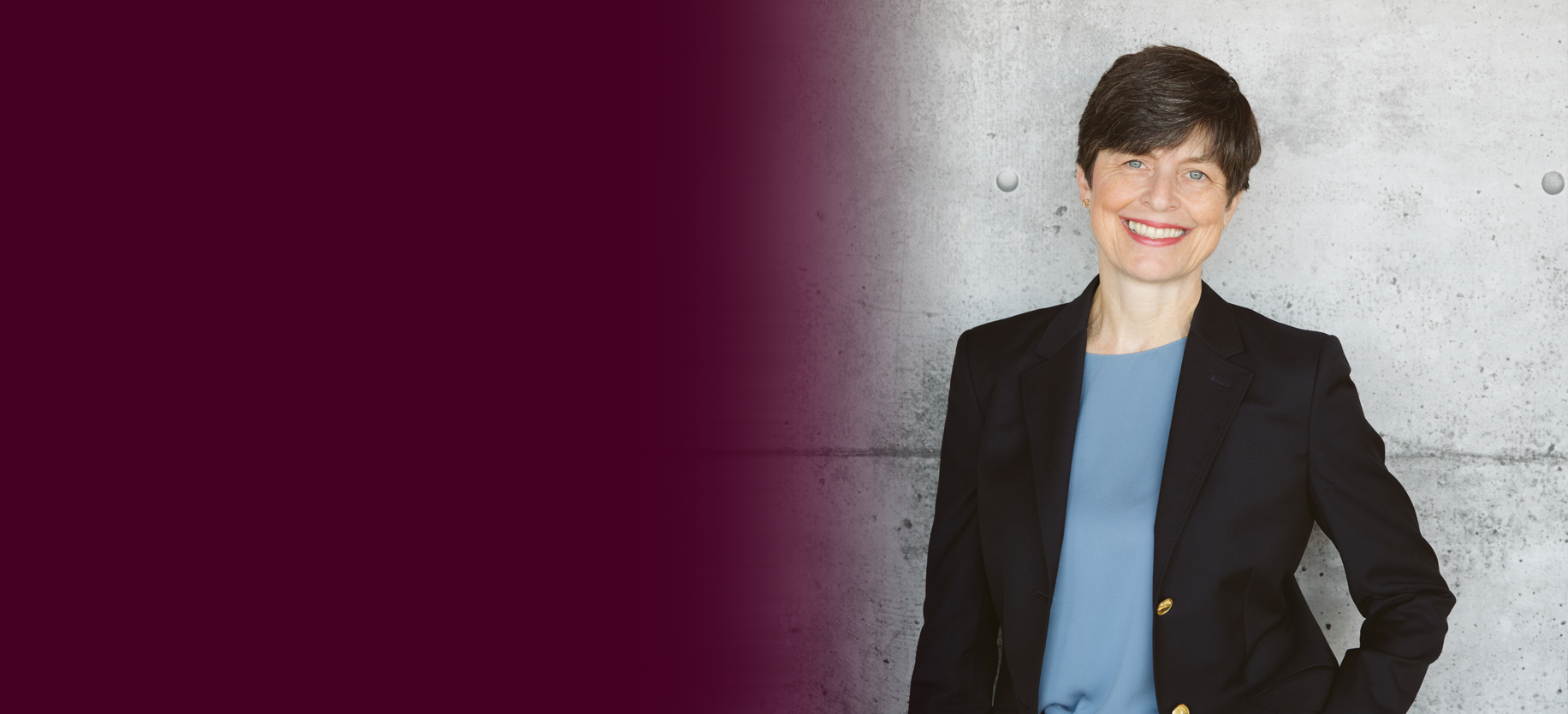With over 35 years of experience, Lisa Ritchie, CFA, has been an invaluable member of Burgundy Asset Management and the Women of Burgundy. Passionate about finance, problem solving, and helping others throughout her entire life, she joined Burgundy in 2014, where she selflessly contributed her talents, finest work, and thoughtful mentorship. Before moving on to her next adventure, Lisa sat down with investment counsellor and newly appointed vice president Kate Mostowyk to discuss her impressive journey, career, and the legacy she hopes to pass on to both investors and counsellors alike.
Kate Mostowyk (KM): Tell us about your journey to a career in finance.
Lisa Ritchie (LR): I grew up in Toronto and was fortunate to enjoy endless opportunities for learning. I was encouraged by my dad, an engineer, and my mom, a teacher, to be curious, studious, and to strive for excellence. At a young age, I was intrigued by business transactions with clear and positive goals. From working at our church’s annual bazaars and rummage sales, to the girl scouts’ cookie sale efforts, to my small holiday baking business my mom seeded, I learned about supply and demand and the magic of creating value for all parties of a transaction. When, as a child, I questioned why my Canadian dollar bought more than one US dollar, I can’t say I understood much of my parents’ explanation around commodity prices, trade, and free-floating currencies, but I tucked it away, knowing that someday I would want to figure it all out. At university, biology first beckoned, and I loved it, but I realized adding business studies would enhance my job prospects and ability to be financially independent. My business school professors sparked in me a keen interest in corporate finance, capital markets, and the psychology that drives investor behaviour. The importance of win/win scenarios in life was instilled in me by my parents’ everyday actions, and I believed that finance should be no different. As I embarked on my business career, it became clear to me that my most meaningful contributions would stem from working with and on behalf of investors, supporting their needs and decision making. From reviewing potential investments and assisting in asset allocation for trusts, estates, and families at Canada Trust, to the analysis of portfolios and their investment managers at pension consulting firm SEI, to guiding individuals, families, and small foundations at storied investment counselling firms Phillips, Hager & North and Burgundy Asset Management, I fulfilled that dream.
KM: What do you love about the investment management business?
LR: I love that it is about people and problem solving. Individuals, families, foundations, and even pension funds share some commonality, but all have unique financial circumstances, investment requirements, and goals. The customization of one’s counselling to the stewardship needs of individual clients makes this business incredibly interesting. A long-term (10 years or more) view for investing is extremely important, but counselling integrates short- and medium-term considerations and requires re-calibration along the way. Add in the ever-changing markets and related media feed, and there literally is not a dull moment. In times of volatility, investors’ resolve is challenged. Emotions can take over, clouding rational thinking, and this exacerbates fears of permanent loss. When market and economic conditions are showing deterioration, it is the counsellor’s responsibility to be a sounding board, remain composed, reassuring, and keep clients on track with their long-term strategy. Being an objective voice of reason and seeing those we advise benefit from this counsel is extremely rewarding.
KM: What does a successful relationship between a client and an investment counsellor look like?
LR: Mutual trust and respect are necessary cornerstones. Open dialogue and collaboration are also key because the effectiveness of the counsellor’s guidance is dependent on the level of understanding of the client’s personal circumstances, financial needs, objectives, and tolerance for volatility. Success is not just about returns. It is about the counsellor being a reliable and caring fiduciary, it is about setting realistic expectations, it is about agreed upon strategy being executed accurately and expeditiously, it is about meeting cash flow requirements, and it is about high-quality communication, proactivity, and responsiveness.
“Success is not just about returns. It is about the counsellor being a reliable and caring fiduciary, it is about setting realistic expectations, it is about agreed upon strategy being executed accurately and expeditiously.”
Alignment of interests within the relationship, with a bias to the benefit of the client is paramount. Commissions and other incentives tied to investment products should never be part of the equation, instead the client’s best interests (not those of the counsellor or the investment firm) must be at the heart of any recommendation the counsellor makes. This builds the foundation for a viable, long-term relationship that I would characterize as win/win.
The clients’ other business relationships, such as those with accountants, financial planners, lawyers, and other investment firms should be complemented by the investment counsellor relationship. Consideration of estate and succession planning, tax planning, family dynamics, and needs leads to a robust investment plan and assures the client that their wealth is being stewarded according to their needs.
Paradoxically, the pandemic provided an opportunity to build stronger relationships with clients. We weren’t meeting in person, but we had a window into their homes and regularly met other members of their families (including their pets). And they were seeing us in our own home environment too. The discussions went beyond investments to talking about the world situation, family matters, health, and celebrating frontline health care workers. It revealed what was truly important in our clients’ lives.
KM: How do you build trust?
LR: Prove you are reliable time and time again. Do what you say you are going to do. Ask questions, be empathetic, flexible, treat others with interest and respect. Be honest and transparent. When the outlook is dire and you perceive that potential returns are not attractive, be candid. Also, I can’t overemphasize the importance of listening. Being subject matter experts, we can be prone to dominating financial discussions, launching into dissertations about asset allocation strategies, stock and bond valuations, earnings per share, cash distributions, and how great one’s employer’s deliverables are. While the intent to inform may be admirable, the conversation is often one-sided and can be perceived as tone deaf to the issues clients want addressed. This is not conducive to building trust. People need to know you are interested in them and their own situation. Ask questions, make notes, revisit issues discussed previously. Clients need to know that you are acting on their (own unique) behalf while they retain overall agency.
KM: What are the important building blocks of creating an investment strategy for clients?
LR: Firstly, as a counsellor, you need to have studied and experienced investing yourself. You must have a thorough understanding of the investments that will be included in the strategy, how they fit together, and how they are expected to benefit the client. As stated by famed investor Warren Buffet, stay within your circle of competence. It is important to have a team of specialists, like the investment analysts and portfolio managers at Burgundy, to look after the specific stock and bond purchase and sale decisions within the agreed upon strategy.
A counsellor is equipped to provide their best guidance after performing full due diligence regarding the client’s personal goals and investing purpose. For instance, are the investments for the benefit of the current generation or is the wealth to be stewarded solely for future generations? The counsellor should understand the client’s historical and existing relationship with money, their cash flow needs, asset holdings, liabilities, and emotional ability to remain invested during turbulent times. It is very helpful to know about their career, their family, their philanthropic goals. This robust knowledge provides clarity for the counsellor to propose a strategy, within the confines of fiduciary responsibility.
KM: What lessons would you hope to leave with our clients?
LR: What I want to teach our clients is that they can and should rely on a team of experts to help them achieve their goals. Investing can be extremely emotionally draining if you get lost in the fray of daily media coverage and short-term market fluctuations. Try to adopt and maintain a long-term focus. If your financial portfolio is invested in stocks and bonds of high quality, price declines in the short-term may be unnerving, but they do not represent permanent losses if you remain steadfast and resist selling out. Rely on the experts you hire. They are the ones that need to sweat the details, navigate the markets and keep your portfolio on its long-term track. Having said this, make sure you always exercise your agency, ask questions, and are forthcoming with your objectives and expectations. Ensure that you have experts that are advocating for your success and make changes if you discover they are not.
KM: You have mentored many of the counsellors at Burgundy, including me. What does mentorship mean to you?
LR: I loved this aspect of my role at Burgundy. Having been blessed with multiple opportunities to study and work in my chosen profession over the better part of 40 years, an important way to give back is mentoring those who are aspiring to succeed in a finance career. If done well by me (and by others), it accelerates the next generation’s progress, and because mentees see themselves as being valued, it builds loyalty within our profession. The knowledge base is broadened, and capabilities are enhanced, ultimately benefiting a broad spectrum of people, not the least of which is clients.
I see it as a responsibility to pass along the knowledge and perspective I gained from experiencing and counselling clients through multiple family situations, multiple market cycles, and varying economic conditions. I hope by doing so, it gives my mentees a jump start in their careers. Providing intelligence and a shoulder to lean is a small way I can contribute to their progression.
Selfishly, I have benefitted immensely from my mentees. They keep me on my toes and current, keep the gray matter stimulated, if you will. I derive great satisfaction from helping others. Another win/win.
“When market and economic conditions are showing deterioration, it is the counsellor’s responsibility to be a sounding board, remain composed, reassuring, and keep clients on track with their long-term strategy.”
KM: What would you advise your younger self?
LR: I would tell myself to seek a mentor, seek a sponsor—these could be the same person. I would also advise myself not to worry about perceived barriers to success, to be assertive in pursuing advancement, and to be my own advocate.
In my day, there were very few female role models in our industry. Although this never affected my desire to study and advance my knowledge and professional capabilities, I think it may have had a bit of a dampening effect on my ambition in the early years. I would love to tell my younger self not to let this discourage me. There is no set path according to gender, go ahead and set the bar high!
KM: What have been some of the happiest moments in your career?
LR: I believe whatever position you are in, you can always learn, grow intellectually, and improve the job you do. This is what I have aspired to and, because there is never a shortage of what one can learn about people, their psychology, and the world of investments, there have been many happy moments for me.
A career highlight has been co-leading Women of Burgundy with Anne Maggisano. It has been challenging (in an incredibly good way) to build such a wonderful movement from the ground up. It has also been extremely fulfilling to impart knowledge, build confidence in others, and provide a community to rely on for investing and finance intelligence. Working alongside Anne, who is a very strategic thinker and a visionary, has been truly remarkable. It made me a better counsellor and a better person. I hope it has helped others and encouraged women to exercise their agency and continue to reach for higher levels of achievement.
KM: What is the legacy you hope to leave behind for Burgundy, for the financial industry, for clients?
LR: I hope my legacy inspires young women and men from all walks of life who are interested in a career in finance to pursue their dream. I hope my legacy encourages the pursuit of excellence, of higher learning, and a realization that a sustainable business model within this industry requires that the core purpose must be about benefiting the clients. Every activity, every investment, every piece of advice, needs to pass this litmus test.
This post is presented for illustrative and discussion purposes only. It is not intended to provide investment advice and does not consider unique objectives, constraints or financial needs. Under no circumstances does this post suggest that you should time the market in any way or make investment decisions based on the content. Select securities may be used as examples to illustrate Burgundy’s investment philosophy. Burgundy funds or portfolios may or may not hold such securities for the whole demonstrated period. Investors are advised that their investments are not guaranteed, their values change frequently and past performance may not be repeated. This post is not intended as an offer to invest in any investment strategy presented by Burgundy. The information contained in this post is the opinion of Burgundy Asset Management and/or its employees as of the date of the post and is subject to change without notice. Please refer to the Legal section of this website for additional information.

